A whopping 91% of business executives plan to increase their social media marketing budgets in the next 3 years.
Social media marketing is clearly important in today’s increasingly digital world. But before you follow suit and increase your investment in social media or join new social media platforms, we urge you to pause and evaluate how you’re participating. Are your current social media channels, strategies, and processes actually generating results? Or are you simply posting to populate your feed?
Some businesses post on social media because they know they are supposed to, but they aren’t sure if or how it’s benefitting them. A social media audit is a great opportunity to take stock and evaluate the effectiveness of your social media presence so that you can develop a more informed social media strategy.
In this article, we’ll help you understand what a social media audit is and what it typically includes. We’ll share the most important steps to take and highlight examples of different types of social media audits. With all this information under your belt, you can make an informed decision on whether to conduct the audit yourself or hire an agency or consultant to support you.
How to Do a Social Media Audit
If you’re thinking about doing a social media audit, you can either tackle the audit yourself, hire a social media expert to handle it for you or collaborate with a social media consultant. Depending on how important social media is to your business and how active you are on different social platforms, the social media audit can be very simple and straightforward or more in-depth and strategic.
Regardless of how you choose to go about your social media audit, there are seven important steps to include in the audit process:
- Take stock of all the social media accounts you own (whether you actively use them or not) and consolidate the details into one spreadsheet. Note which accounts are most active and high-priority for your business. Do a quick search and check for any fraudulent accounts that might be out there. Ensure your profiles are fully complete, up-to-date, and on-brand. You want the branding and messaging across your profiles to be as consistent as possible.
- Dive into the analytics of each social media platform you own. Most social media platforms have built-in analytics for business profiles that you can view– or there are third-party tools you can use. Take note of engagement metrics, demographic information, top posts, plus your impressions and reach.
- Look for patterns as you review your analytics. Perhaps you’ll notice that your engagement rates are higher for video posts compared to photos. Or maybe your posts that ask your audience a question tend to generate more comments. Maybe your client testimonial posts perform much better on LinkedIn compared to Instagram. Come up with theories to test out with your future posts. The more aware you are of patterns like these, the better you will understand your different audiences.
- Learn from your key competitors. Do a similar audit of your competitor’s social media profiles to see what kinds of posts they are sharing and which tend to perform best. Draw on their content and themes for inspiration, but think about what you can do differently to stand out from the crowd.
- Set social media goals for the year ahead. Identify opportunities for growth and areas for improvement. Oftentimes, social media goals center around improving engagement, brand awareness, reputation, traffic to your website, conversions, sales, lead generation, customer service, etc. Try to set goals that are specific, measurable, achievable, relevant, and time-bound (S.M.A.R.T.)
- Determine key social media metrics to measure your performance and keep you on track to achieve your goals. Try to come up with a few metrics for each goal that you set. You can use native analytics that come with various social media platforms and manually pull reports, or invest in a social media analytics tool to save you time and make monitoring your metrics more automated.
- Create your annual social media strategy/plan for the year ahead. In addition to goals and metrics, you should include a content calendar to help you plan around important dates, seasonal promotions, and campaigns. You should also define roles/responsibilities and outline processes for planning, production, and analysis.
- Consider adding new platforms to expand your reach and stay relevant. Social media is an ever-evolving landscape, so an annual social media audit is the perfect time to determine whether it’s worth joining a new platform to keep up with the times and your competition. You may also determine that an old platform is no longer serving you and it’s time to “clean house.” More is not always better.
- Consider investing in more social media support, consulting, tools, or training. An audit should also help you identify areas where you’re falling short with your social media planning and production. If you aren’t posting regularly, hiring a dedicated social media person or outsourcing to a social media support service can help you improve consistency and stay top-of-mind. Or if you’ve hit a plateau and are struggling to grow or achieve your goals, a social media consultant can help you put together a strategy to guide you.
What is a Social Media Audit? And What Does it Include?
A social media audit is an unbiased examination and evaluation of your business’s social media presence and performance to determine strengths, weaknesses, and opportunities. The social media audit can be completed internally or through an external consultant or marketing company. Because the goal is to examine and evaluate in an unbiased manner, many businesses find it more valuable to gain an outsider’s perspective and expertise.
The steps outlined in the section above are the main building blocks of a social media audit, but audits vary in style, length, and depth. As you can imagine, a social media audit for a small business owner who posts on Facebook twice a month is going to look very different from an audit for a large e-commerce brand that posts on multiple platforms and has different promotional campaigns running simultaneously.
Regardless of how detailed and involved your social media audit is, it should focus on answering these three all-important questions:
- What’s working?
- What’s not working?
- What changes/improvements can you make?

Importance of Understanding Your Social Media Presence
So many businesses are active on social media but don’t make time to audit their efforts. But if you don’t ever pause to evaluate what you’ve been doing, there’s no way to know if you’re on the right track to achieve your goals. They say, “if you have time to do something, you have time to do it right.” Stop wasting your company’s time and resources posting content that just adds to the digital clutter and doesn’t move the needle toward your goals.
As the digital landscape evolves, it’s getting harder and harder to cut through the noise and get noticed on social media. Because of this, it’s more important than ever to develop an informed and targeted strategy to guide your efforts. Conducting a regular social media audit will help you develop a more clear understanding of your social media presence and performance. With this information, you can ensure that you’re using your company’s time and resources most cost-effectively and strategically.
A professional social media audit can help your business improve your social media strategy in the following ways:
- Eliminating guesswork so you can stop wasting time and money
- Identifying gaps and opportunities so that you can continually improve
- Growing your presence and reaching more potential customers
- Clearly defining success and tracking your progress so that you can actually achieve your goals
- Determining best practices to improve consistency and effectiveness across different platforms
- Establishing internal processes to ensure those best practices are followed
- Improving your understanding of your competitors and ensuring you don’t fall behind
Cost of a Social Media Marketing Audit
Hiring an agency to do a social media audit can cost anywhere from $500 to $5,000. It really depends on how much there is to audit– in other words, how active and involved you are across different social media platforms. How many posts are there to sift through? How many campaigns have you carried out? Are you running social ads? Is this your first time auditing your social media marketing? The first social media audit you carry out will likely be the most expensive and time-consuming, but the process should get more efficient and affordable in the future if you invest in regular audits (annually or quarterly).
The cost of a social media audit also varies depending on what’s included in the audit and who carries it out. For example, some audits include optimizations or a strategy to guide future efforts. If you’re a small business looking for a more affordable social media audit, look to hire a small business marketing agency with flexible support packages that can be tailored to your needs.
Social Media Audit Examples
To give you a more concrete understanding of a social media audit, here are some excerpts from an audit report we recently prepared for @hungryinportland (HIP), a food and drink influencer in Portland, Oregon.

To start, we took stock of all the HIP social media accounts, noting whether they were active or inactive and their level of priority. We also noted other potential social media platforms and whether they were high or low opportunities for HIP.
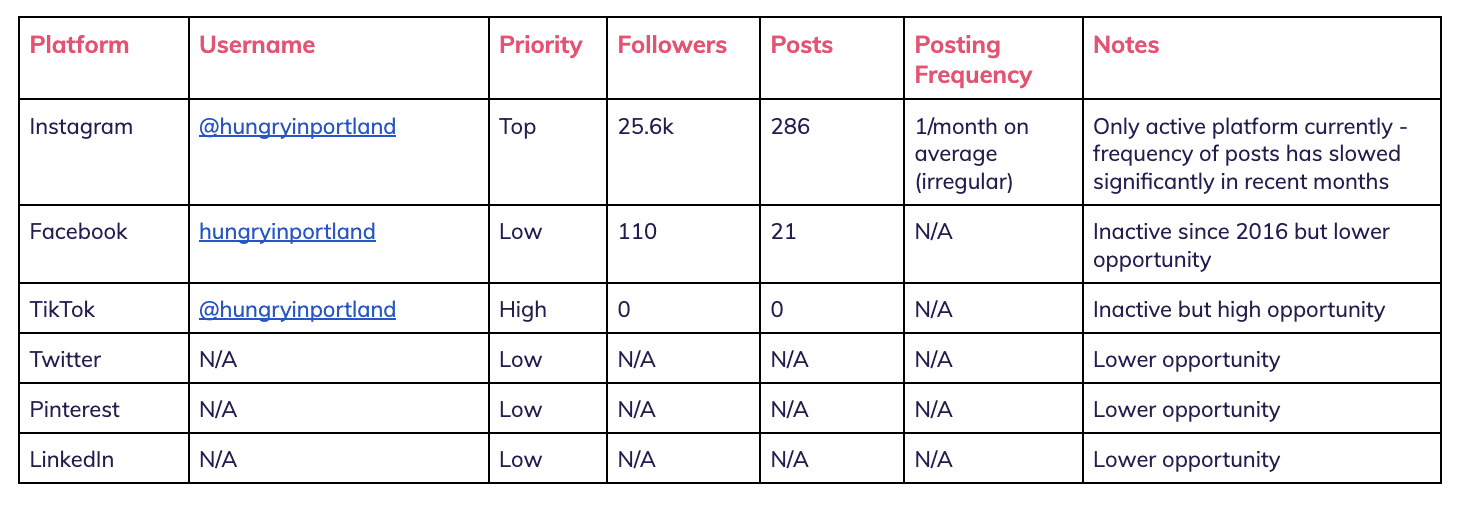
Next, we dove into the analytics, focusing on Instagram analytics as that was HIP’s only recently active social media platform. We highlighted important demographics such as age range, gender, and top locations to help HIP gain a better understanding of its audience.
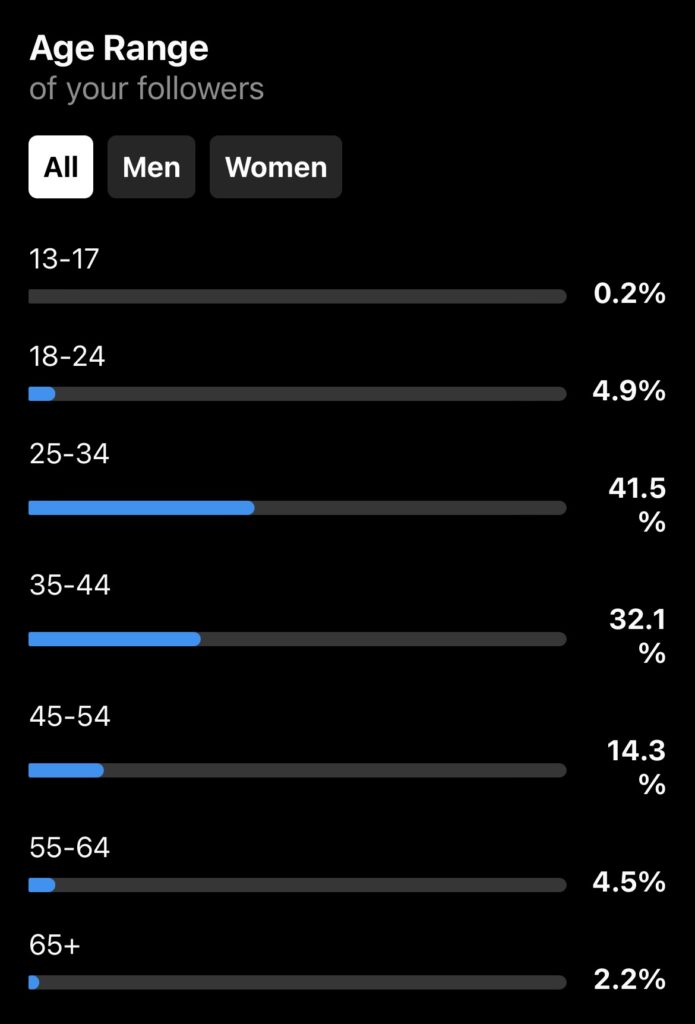
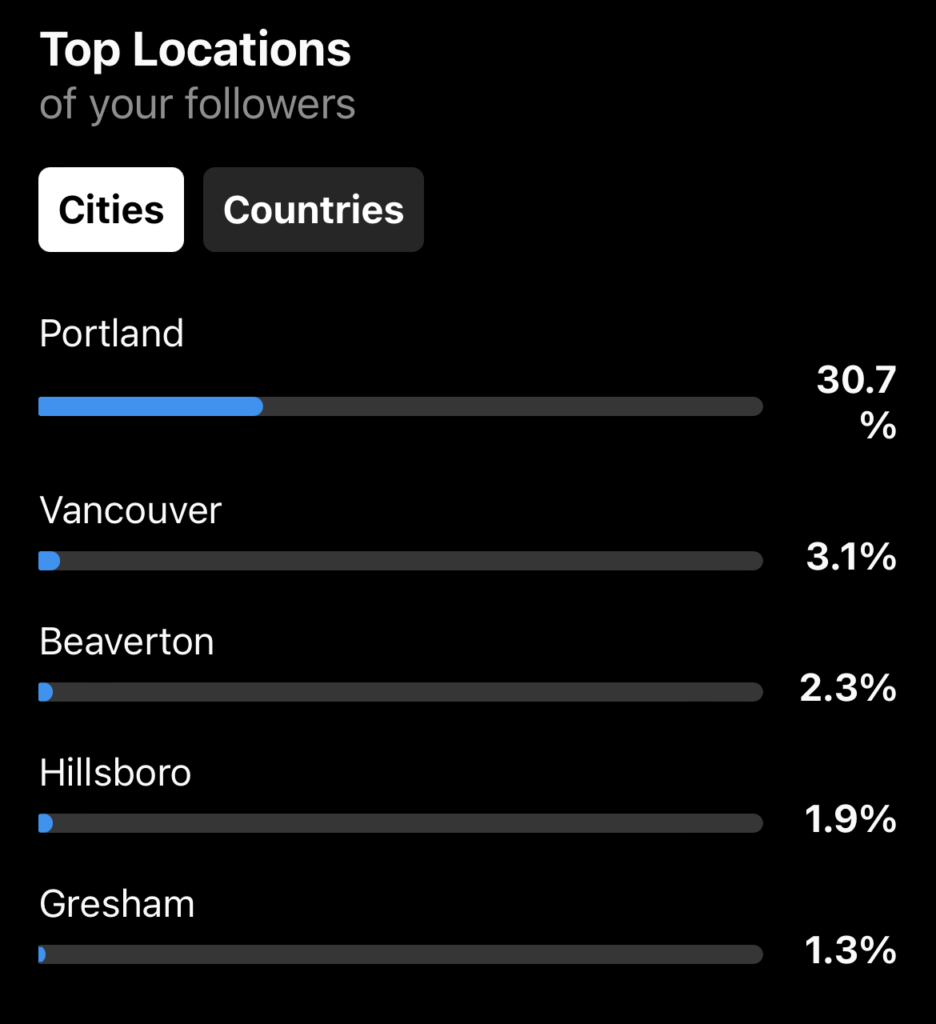
We looked for key trends and patterns:
“We noticed a spike in new followers that closely corresponds with your new post. Your most recent post featuring Buddy’s Steaks generated a 3% profile visit to follower conversion rate, which is above average. Clearly, HIP is most successful in gaining profile visits and followers when your profile has a new or recent post. Posting more frequently and consistently will help improve your visibility and conversion rate.”
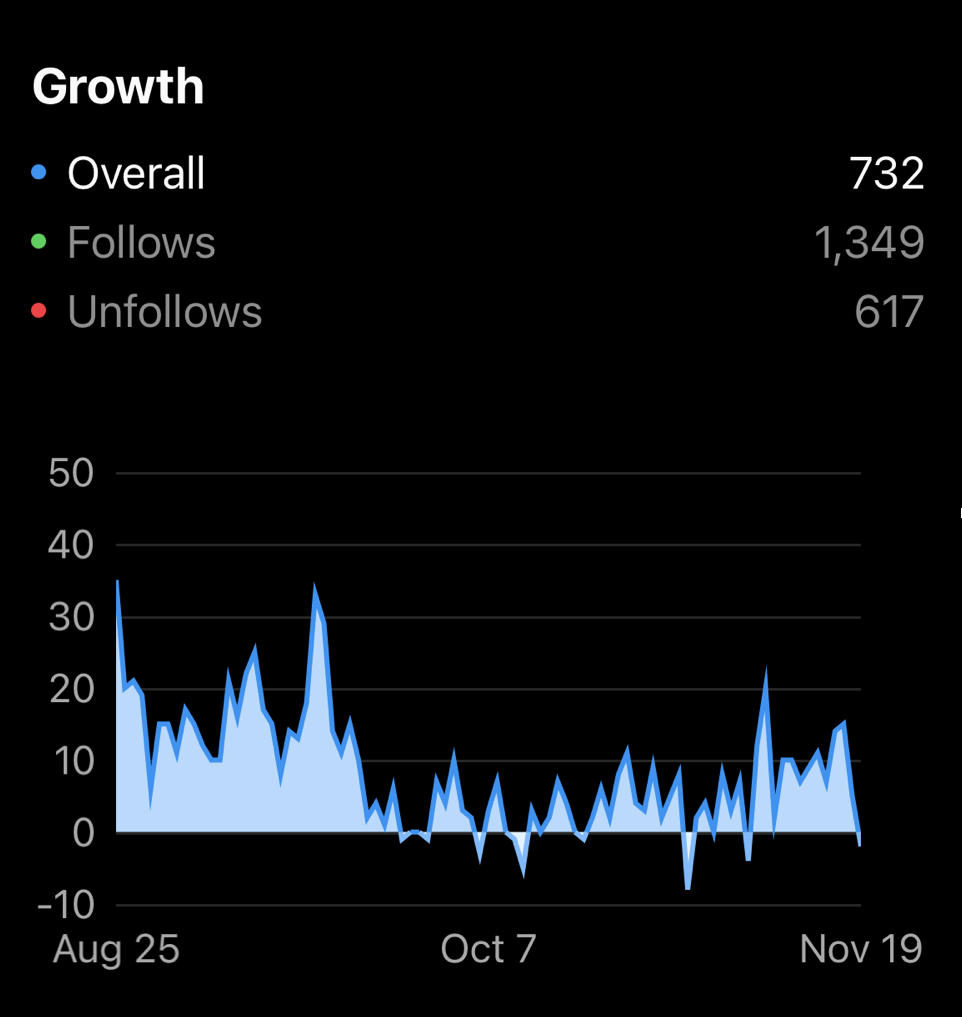
We also highlighted key metrics to help inform goals for the next quarter:
“In the last 90 days, only 1.8% of HIP’s total followers were engaged. There is room for improvement here. Percentage of followers engaged is a powerful metric that can help you monitor in the future to help measure your progress.”
Next, we took a look at HIP’s top competitors to learn from their strategies and what they do differently:
“Your top competitor has 30.3k followers, which is only 4,610 more than HIP, but her posts are getting many more likes (in the thousands of likes per post), though just slightly more comments. Every 3-4 posts on her feed is a Reel. She is very active on TikTok as well. She has a link to her website in her bio. She posts more photos of herself and is making herself part of the brand, which helps with authenticity. She has expanded her brand to focus on clothes, travel, skincare, etc. in recent years”
Lastly, we summarized our findings and made key recommendations. Below is a small excerpt of our final report:
“You have established a very large Instagram following, which gives you an edge over many of your competitors and positions you for easier, more organic growth in the future. Even now, you’re gaining new followers every day, even when you aren’t posting regularly. You could say you’re in the “sweet spot” for growth.
However, the majority of your competitors are posting much more frequently and consistently on Instagram. They are also leveraging Reels and gaining more reach and engagement through video content. Several of your competitors have also joined TikTok, which is allowing them to reach younger demographics and stay relevant in the hip Portland food scene. Emulating a few of these strategies should help expand your reach and improve your engagement rates.”
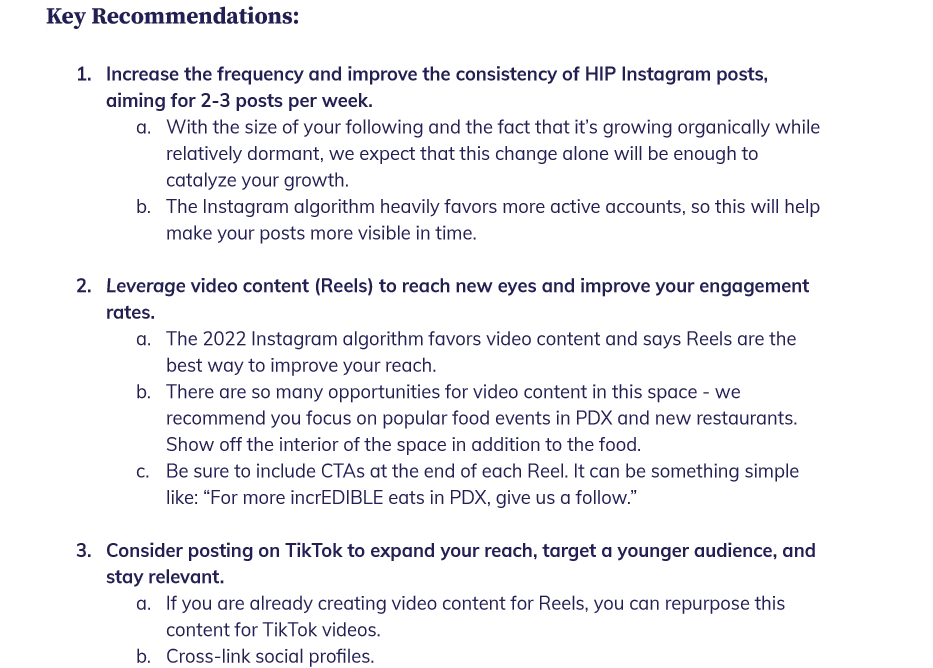
Different Types of Social Media Audits
Professional social media audits can look vastly different depending on your type of business and industry, so we put together a few examples to help you get a sense of the possibilities:
Brand Social Media Audit: This is a more general type of social media audit that focuses on the image and reach of your brand on social media. A Flyrise brand social media audit will analyze all of your social media channels and generate a report on the state of your current online performance and what you can do to improve it. We’ll identify and analyze all your social media profiles to ensure they are on-brand and track the performance of your posts to identify patterns. We also include detailed demographic information so that you can better understand and target your audience.
Product Social Media Audit: Marketing and selling your products on social media is no easy task. A product social media audit from Flyrise will thoroughly analyze and track all of your social media marketing for your products, showing you what’s currently working and what needs to be improved. We will identify which posts perform the best in terms of engagement and conversions so that you can get laser-focused on the content that actually generates results and boosts your product sales. We’ll also present you with new opportunities for product marketing.
B2B Social Media Audit: Social media audits can benefit all different types of businesses, but they are especially important for B2B companies. That’s because B2B businesses are faced with unique social media marketing challenges. B2B target audiences tend to be much more specific, which requires more thoughtful and creative strategies to target and engage them. With this in mind, our B2B social media audit services promise you in-depth audience insights, allowing you to understand the demographic of your social media followers and subscribers. With this, you’ll have access to relevant information such as their age, location, interests, and more. This valuable information sets you up to create a comprehensive social media marketing strategy that successfully converts social media leads into actual customers. This type of audit also includes a detailed analysis of your competitors.
Try Our Social Media Audit Service
If tackling a social media audit on your own feels overwhelming, we’re here to help! Our social media audit and support services are designed to help small and medium-sized businesses achieve their full potential and compete with much larger companies.
At Flyrise, we offer one of the most comprehensive social media audit services in the industry. Our social media experts will generate an extensive report for you, giving you access to all of the social media performance data you need to know to optimize your digital marketing approach and seize new opportunities for your business.
Aside from gathering important data, our services also seek to support your digital marketing efforts in the following ways:
- Provide expert advice on what to modify, incorporate, and remove from your social media strategy in order to improve online performance
- Uncover efficient opportunities that can help you reach a wider audience, generate more leads, and increase conversion rates
- Find out how you stack up against your competition in terms of social media performance
Book a call with our social media experts today to learn more!








